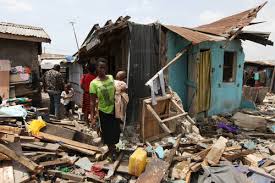The African Development Bank (AfDB) has reported that about 152 million Nigerians live on less than $2 a day, indicating that about 80 percent of the country’s estimated 190 million population is extremely poor.
The bank made this disclosure in it its 2018 Nigeria Economic Outlook report, which is part of the larger African Economic Outlook yearly publication. It described the country’s poverty level as unacceptably high.
According to the bank, Nigeria still faces significant challenges, including foreign exchange shortages, disruptions in fuel supply, power shortages and insecurity in some parts of the country.
This is even as the report stated further that the country’s revenue mobilisation efforts were insufficient at five per cent, the Value Added Tax (VAT) rates among the lowest in the world and revenue administration remained inefficient.
While noting that recovery in oil prices and production would help drive growth and provide fiscal space as the government pursued important structural reforms to diversify the economy, the continental development finance institution also projected that faithful implementation of the Economic Recovery and Growth Plan (2017–20) had the potential of efficiently restructuring the economy.
On the nation’s economic performance in 2017 and prospects for the future, the report stated: “The economy continued to show signs of recovery from the 2016 recession. The Gross Domestic Product growth was estimated at 0.8 per cent in 2017, up from -1.5 per cent in 2016.
“The outlook beyond is positive, with growth projected at 2.1 per cent in 2018 and 2.5 per cent in 2019. This outlook is anchored on higher oil prices and production, as well as stronger agricultural performance. Oil prices rebounded to an average of $52 per barrel (Brent crude) in 2017 and are projected to reach $54 in 2018, up from $43 per barrel in 2016.
“Oil production also increased from 1.45 million barrels per day in the first quarter of 2017 to 2.03 million in the third quarter of 2017 following de-escalation of hostilities in the delta region and is expected to remain at the same level in 2018 and 2019, in tandem with the Organisation of the Petroleum Exporting Countries production restrictions”, AfDB added.
The bank also reported that while the nation’s fiscal policy remained expansionary since 2016, the total spending as a percentage of the GDP however declined from 13 percent in 2014 to 10.3 percent last year just as revenues declined more sharply, from 11.4 per cent to 5.6 per cent.
AfDB clarified further: “The budget deficit was estimated at 4.8 per cent in 2017, up from 4.7 per cent in 2016, and is projected to improve to 4.3 per cent in 2018 and 4.1 per cent in 2019, as revenue performance improves.
“At 14 per cent, unemployment remained high in 2017, the same as in 2016, and is expected to decline only slightly in 2018, to 13.5 per cent, as recovery eases production constraints in manufacturing and agriculture.
“Monetary policy continued to contract in 2017 and is expected to remain so in 2018; the policy rate has been kept at 14 per cent since July 2016 to support the naira and control inflation. Inflation has remained stubbornly high and in the double digits”, the report stated.






